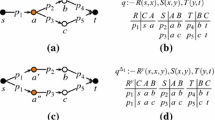Abstract
An optimal probabilistic-planning algorithm solves a problem, usually modeled by a Markov decision process, by finding an optimal policy. In this paper, we study the k best policies problem. The problem is to find the k best policies of a discrete Markov decision process. The k best policies, k > 1, cannot be found directly using dynamic programming. Naïvely, finding the k-th best policy can be Turing reduced to the optimal planning problem, but the number of problems queried in the naïve algorithm is exponential in k. We show empirically that solving k best policies problem by using this reduction requires unreasonable amounts of time even when k = 3. We then provide two new algorithms. The first is a complete algorithm, based on our theoretical contribution that the k-th best policy differs from the i-th policy, for some i < k, on exactly one state. The second is an approximate algorithm that skips many less useful policies. We show that both algorithms have good scalability. We also show that the approximate algorithms runs much faster and finds interesting, high-quality policies.
Similar content being viewed by others
References
Bellman, R.: Dynamic Programming. Princeton University Press, Princeton (1957)
Boutilier, C., Dean, T., Hanks, S.: Decision-theoretic planning: structural assumptions and computational leverage. J. Artif. Intell. Res. 11, 1–94 (1999)
Bonet, B., Geffner, H.: Planning with incomplete information as heuristic search in belief space. In: Proceedings of ICAPS, pp. 52–61 (2000)
Bresina, J.L., Dearden, R., Meuleau, N., Ramkrishnan, S., Smith, D.E., Washington, R.: Planning under continuous time and resource uncertainty: a challenge for AI. In: Proceedings of UAI, pp. 77–84 (2002)
Bresina, J.L., Jónsson, A.K., Morris, P.H., Rajan, K.: Activity planning for the Mars exploration rovers. In: Proceedings of ICAPS, pp. 40–49 (2005)
Aberdeen, D., Thiébaux, S., Zhang, L.: Decision-theoretic military operations planning. In: Proceedings of ICAPS, pp. 402–412 (2004)
Musliner, D.J., Carciofini, J., Goldman, R.P., Durfee, E.H., Wu, J., Boddy, M.S.: Flexibly integrating deliberation and execution in decision-theoretic agents. In: Proceedings of ICAPS Workshop on Planning and Plan-Execution for Real-World Systems (2007)
Nielsen, L.R., Jorgensen, E., Kristensen, A.R., Ostergaard, S.: Optimal replacement policies for dairy cows based on daily yield measurements. J. Dairy Sci. 93(1), 75–92 (2010)
Perny, P., Weng, P.: On finding compromise solutions in multiobjective markov decision processes. In: ECAI Multidisciplinary Workshop on Advances in Preference Handling (2010)
Nielsen, L.R., Kristensen, A.R.: Finding the k best policies in finite-horizon MDPs. Eur. J. Oper. Res. 175(2), 1164–1179 (2006)
Nielsen, L.R., Pretolani, D., Andersen, K.A.: Finding the k shortest hyperpaths using reoptimization. Oper. Res. Lett. 34(2), 155–164 (2006)
Nielsen, L.R., Andersen, K.A., Pretolani, D.: Finding the k shortest hyperpaths. Comput. Oper. Res. 32, 1477–1497 (2005)
Bertsekas, D.P., Tsitsiklis, J.N.: Neuro-Dynamic Programming. Athena Scientific, Belmont (1996)
Howard, R.: Dynamic Programming and Markov processes. MIT Press, Cambridge (1960)
Puterman, M.: Markov Decision Processes: Discrete Stochastic Dynamic Programming. Wiley, New York (1994)
Littman, M.L., Dean, T., Kaelbling, L.P.: On the complexity of solving Markov decision problems. In: Proceedings of UAI, pp. 394–402 (1995)
Bonet, B.: On the speed of convergence of value iteration on stochastic shortest-path problems. Math. Oper. Res. 32(2), 365–373 (2007)
Barto, A., Bradtke, S., Singh, S.: Learning to act using real-time dynamic programming. Artif. Intell. 72, 81–138 (1995)
Wingate, D., Seppi, K.D.: Prioritization methods for accelerating MDP solvers. J. Mach. Learn. Res. 6, 851–881 (2005)
Bonet, B., Geffner, H.: Learning in depth-first search: A unified approach to heuristic search in deterministic and non-deterministic settings, and its applications to MDPs. In: Proceedings of ICAPS, pp. 142–151 (2006)
ICAPS-06: 5th International Planning Competition (2006). http://www.ldc.usb.ve/~bonet/ipc5/
Dai, P., Goldsmith, J.: Finding best k policies. In: Proceedings of ADT, pp. 144–155 (2009)
Author information
Authors and Affiliations
Corresponding author
Rights and permissions
About this article
Cite this article
Dai, P., Goldsmith, J. Ranking policies in discrete Markov decision processes. Ann Math Artif Intell 59, 107–123 (2010). https://doi.org/10.1007/s10472-010-9216-8
Published:
Issue Date:
DOI: https://doi.org/10.1007/s10472-010-9216-8




